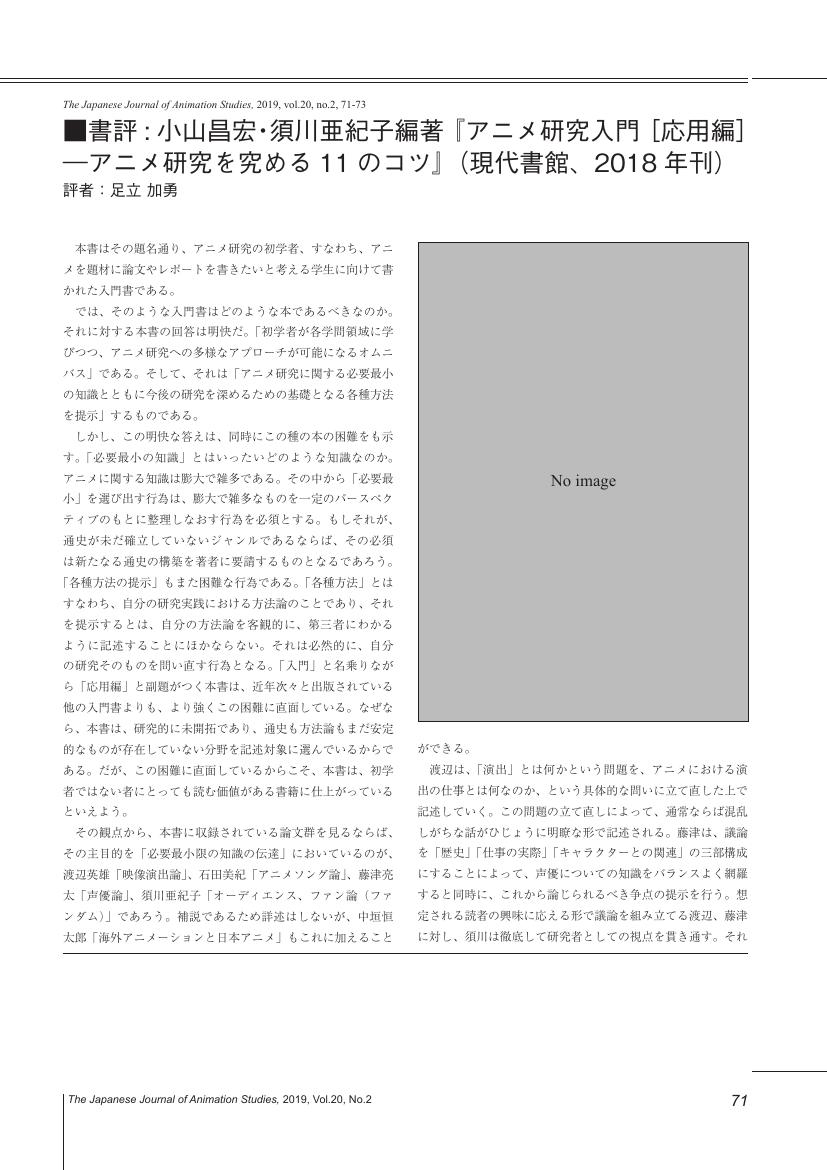- 著者
- 足立 加勇
- 出版者
- 日本アニメーション学会
- 雑誌
- アニメーション研究 (ISSN:1347300X)
- 巻号頁・発行日
- vol.13, no.1, pp.13-23, 2012
10 0 0 0 OA 日本のマンガ・アニメにおける「戦い」の表象
- 著者
- 足立 加勇 Kayu Adachi
- 出版者
- 学習院大学
- 巻号頁・発行日
- 2015-03-07
日本のマンガ・アニメにおいて「戦い」は繰り返し描かれてきた重要なテーマである。それにもかかわらず、「戦い」を主題とし、その描かれ方を一定の視点から分析した論考は少ない。本論文は、マンガ・アニメの「戦い」にいくつかの類型を見出し、それぞれの「戦い」の表象の特性を分析することによって、日本のマンガ・アニメにおける「戦い」の表象とその受容を支える物語および心性のメカニズムを探るものである。ベネディクト・アンダーソンは『想像の共同体』において、人はなぜ「国民」という抽象的なもののために殺し合いをおこない、自らすすんで死におもむくのか、という問題を扱った。アンダーソンは「国民」に限らず、成員同士が常に顔をあわせる村落共同体以外の全ての共同体意識が想像の産物だとする(村落共同体もおそらくは想像の産物だとも述べている)。そして、「国民」は新たな共同体意識が想像されるようになったことにより、旧来の「想像の共同体」である「宗教共同体」「王国」が減衰したために誕生したものとした。アンダーソンは、新たな共同体意識の生成とその再編成に、出版資本主義が大きな役割を果たしたと指摘する。アンダーソンの指摘は、共同体意識とメディアによる消費者開拓の結びつきを明らかにしたものといえる。共同体意識と消費者開拓の結びつきは、日本のマンガ・アニメの受容においても確認できる現象である。特に、マンガ・アニメのファン共同体が「国民」と同じ「水平・世俗的、時間・横断的」なものであることが、アンダーソンが論じた「国民」とマンガ・アニメのファン共同体を似た性質を持つものにしている。今日のマンガ・アニメでは、ファン共同体の生成、維持、そして、その強化が大きな課題となっている。その理由は、主に、社会の閉塞感や不安のため、人々の互いを結ぶ紐帯に対する欲求がたかまっていることと、マンガ・アニメが安定した収入源を必要としていることの二つに求められる。そのため、マンガ・アニメの作品展開は、アンダーソンが論じた共同体意識の生成過程を縮小した形で反復するようになっている。このことは、マンガ・アニメの物語内容にも影響を与え、その形態を決定する要因となっている。現在のマンガ・アニメにおける「戦い」は、共同体の紐帯となる絆を語り、絆による勝利を語ることで、共同体意識の生成、維持、強化に資するものとなっている。その「戦い」の物語を成立させるメカニズムは、現実において戦闘を正当化し、誘発するメカニズムとも強い関連性を持っている。本論文は、マンガ・アニメに新たな共同体意識の発生を見るという視点を保ちつつ、日本のマンガ・アニメにおける「戦い」の諸相とその心的根拠を考察していく。その考察において重視するのは傷つく身体の表現である。想像されるものでしかない共同体意識の価値は、自分がその共同体の一員であるという意識を持つためにどれだけの犠牲を払えるか、ということによって示され、その犠牲の最もわかりやすい形が死や負傷だからである。共同体意識の生成、維持、強化に資する表現は、死の表現と深い関連性を持つ。本論文は、「戦い」を題材としたマンガ、アニメに対する考察を、「傷つく身体」と「記号的身体」を巡って展開されたキャラクター論から始める。1 章の1 節では、傷つく身体を巡るマンガ論の展開を追う。今日のマンガ論では、マンガやアニメのキャラクターは、極度にコード化された図像であり、記号的な性質が強いものとして理解されている。現実の人間は傷つき、苦しむものであるという認識は、そのような記号的な身体を持つキャラクターに対しても、傷つき、苦しむことを要請する。身体の問題は、リアリズムの問題、および、現実と虚構の接点がどのように構築されるべきか、という問題に発展する。2 節では、これらのマンガ論の前提となる、キャラクターの身体を構成する記号的な要素について考察する。これは、マンガやアニメを愛好する者たちの間では自明のものでありながら、口に出して説明されることがないものを明文化する試みである。また、この試みによって、80 年代後半頃から生じたキャラクターを構成するコードのあり方の変化が何であったかを明らかにする。その変化は、キャラクターとその受容者の関係を大きく変えていく。3 節では、「プリキュア」シリーズをとりあげ、キャラクターとその受容者の関係の変化が作品内容をどのように変えていくかを考察する。そこでは、キャラクターとその受容者の間に双方向的な関係が発生することが期待され、作品内における登場人物間の友情と、作品の愛好者が登場人物たちに対して抱く支持の感情の同一化がはかられる。作品の目的は、物語を語ることから、キャラクターとその受容者の間に互いを肯定する関係を作り出し、キャラクターを中心とした共同体意識を生成することへと移行する。それは、キャラクターを中心とした「絆」の現実における生成過程ととらえることも可能であろう。第2 章は、作品の物語内容を分析する。傷つく身体の表現は、マンガ、アニメを巡る言説の中では「リアリズム的な表現」であると考えられている。主人公が強大な悪に対して逆転勝利するという「戦い」を題材としたマンガ、アニメの物語内容は、「リアリズム的な表現」と必ずしも相性が良いものではない。マンガ、アニメに傷つく身体の表現を求めるリアリズム的要請は、その起点を第二次世界大戦における敗戦に設定することができるであろう。1 節、2 節では、リアリズム的要請に応えることと、主人公の勝利の両立が、戦後マンガ、アニメ史においてどのように実現されていったかを考察する。その両立は、傷つく身体を超克する奇跡が、「絆」を根拠に発生し、「絆」は、その正しさを奇跡の発生によって証明するという、循環論法的なメカニズムの確立によって実現されることになる。「絆」とそれが持つ循環論法的なメカニズムに耽溺を望む心情と、そのようなメカニズムに対する批判的な視線の共存が、「戦い」を描く日本のマンガ、アニメを根底で支えている。3節では、その具体例として『GUNSLINGERGIRL』をとりあげ分析する。第3章、第4章、第5章は、日本の「戦い」を題材としたマンガ、アニメから、身体の在り方を基準に三つのジャンルをとりあげ、それぞれ具体的に作品を分析していく。本論は、身体と科学技術の関係という関係から、「格闘マンガ」「サイボーグマンガ」「ロボットアニメ」の三つを、日本の戦うマンガ、アニメを代表する三つのジャンルとして抽出する。「格闘マンガ」とは、ここでは、スポーツの一種としての格闘技ではなく、格闘という形式に基づき登場人物達が戦うマンガ、アニメを指す。格闘は、科学の関与しない、人間が生まれ持った自然の肉体を持って戦うことを前提としている。それ故に、戦うことの正当性は人間の本性に基づいた自明のことであるとされ、戦うことの歓喜が耽美的に描かれてきた。それに対して、「サイボーグマンガ」におけるサイボーグとは、科学の力によって肉体を戦うための機械に改造された人々を指す。彼らは、超人的な力を持つものの、肉体を他者に奪われたという意識が劣等感を生み、その戦いは常に自己否定の契機をはらんでいる。一方、「ロボットアニメ」は、中に人間を乗せたロボットが活躍するという内容のアニメである。「格闘マンガ」の登場人物が自然の肉体に、「サイボーグマンガ」の登場人物が機械の肉体に縛られるのに対し、機械のロボットから自然の肉体を持ったパイロットが自由に乗り降りできる、つまり、機械と肉体を任意に選択することができるという特異性を持つジャンルである。第3章では「格闘マンガ」を、第4 章は「サイボーグマンガ」を、そして、第5 章は、「ロボットアニメ」について論じる。この三ジャンルは、それぞれ、「戦い」を題材にしたマンガ、アニメの世界において三つの極を作っているものといえる。三者の比較することで、三つのジャンルがそれぞれどのような物語を生成してきたのか、そして、その中で「戦い」とそれに伴う「犠牲」の関係が、時代の変化の中でどのように変わってきたのかを見ていく。そして、「戦い」を題材とした日本のマンガ・アニメにおいて、共同体の紐帯となり、個人に、この世界における位置づけを与える「絆」がどのような形で特権化されてきたのかを明らかにする。その「絆」は、単に物語内のものに留まらず、その作品を受容する人々をも含むものとなっている。現在では、コンテンツとコミュニティの親和性は製作者、消費者の双方に認識され、意識的に作品に反映される。主人公が傷つき倒れても、再び立ち上がって戦い、そして勝利する姿を描くマンガ・アニメ作品は、互いの共同性が信じる集団の結束を確認して強化するための死と再生の儀式となっているのである。
9 0 0 0 OA 日本のマンガ・アニメにおける「戦い」の表象
- 著者
- 足立 加勇
- 巻号頁・発行日
- 2015-03-30 (Released:2015-03-13)
日本のマンガ・アニメにおいて「戦い」は繰り返し描かれてきた重要なテーマである。それにもかかわらず、「戦い」を主題とし、その描かれ方を一定の視点から分析した論考は少ない。本論文は、マンガ・アニメの「戦い」にいくつかの類型を見出し、それぞれの「戦い」の表象の特性を分析することによって、日本のマンガ・アニメにおける「戦い」の表象とその受容を支える物語および心性のメカニズムを探るものである。ベネディクト・アンダーソンは『想像の共同体』において、人はなぜ「国民」という抽象的なもののために殺し合いをおこない、自らすすんで死におもむくのか、という問題を扱った。アンダーソンは「国民」に限らず、成員同士が常に顔をあわせる村落共同体以外の全ての共同体意識が想像の産物だとする(村落共同体もおそらくは想像の産物だとも述べている)。そして、「国民」は新たな共同体意識が想像されるようになったことにより、旧来の「想像の共同体」である「宗教共同体」「王国」が減衰したために誕生したものとした。アンダーソンは、新たな共同体意識の生成とその再編成に、出版資本主義が大きな役割を果たしたと指摘する。アンダーソンの指摘は、共同体意識とメディアによる消費者開拓の結びつきを明らかにしたものといえる。共同体意識と消費者開拓の結びつきは、日本のマンガ・アニメの受容においても確認できる現象である。特に、マンガ・アニメのファン共同体が「国民」と同じ「水平・世俗的、時間・横断的」なものであることが、アンダーソンが論じた「国民」とマンガ・アニメのファン共同体を似た性質を持つものにしている。今日のマンガ・アニメでは、ファン共同体の生成、維持、そして、その強化が大きな課題となっている。その理由は、主に、社会の閉塞感や不安のため、人々の互いを結ぶ紐帯に対する欲求がたかまっていることと、マンガ・アニメが安定した収入源を必要としていることの二つに求められる。そのため、マンガ・アニメの作品展開は、アンダーソンが論じた共同体意識の生成過程を縮小した形で反復するようになっている。このことは、マンガ・アニメの物語内容にも影響を与え、その形態を決定する要因となっている。現在のマンガ・アニメにおける「戦い」は、共同体の紐帯となる絆を語り、絆による勝利を語ることで、共同体意識の生成、維持、強化に資するものとなっている。その「戦い」の物語を成立させるメカニズムは、現実において戦闘を正当化し、誘発するメカニズムとも強い関連性を持っている。本論文は、マンガ・アニメに新たな共同体意識の発生を見るという視点を保ちつつ、日本のマンガ・アニメにおける「戦い」の諸相とその心的根拠を考察していく。その考察において重視するのは傷つく身体の表現である。想像されるものでしかない共同体意識の価値は、自分がその共同体の一員であるという意識を持つためにどれだけの犠牲を払えるか、ということによって示され、その犠牲の最もわかりやすい形が死や負傷だからである。共同体意識の生成、維持、強化に資する表現は、死の表現と深い関連性を持つ。本論文は、「戦い」を題材としたマンガ、アニメに対する考察を、「傷つく身体」と「記号的身体」を巡って展開されたキャラクター論から始める。1 章の1 節では、傷つく身体を巡るマンガ論の展開を追う。今日のマンガ論では、マンガやアニメのキャラクターは、極度にコード化された図像であり、記号的な性質が強いものとして理解されている。現実の人間は傷つき、苦しむものであるという認識は、そのような記号的な身体を持つキャラクターに対しても、傷つき、苦しむことを要請する。身体の問題は、リアリズムの問題、および、現実と虚構の接点がどのように構築されるべきか、という問題に発展する。2 節では、これらのマンガ論の前提となる、キャラクターの身体を構成する記号的な要素について考察する。これは、マンガやアニメを愛好する者たちの間では自明のものでありながら、口に出して説明されることがないものを明文化する試みである。また、この試みによって、80 年代後半頃から生じたキャラクターを構成するコードのあり方の変化が何であったかを明らかにする。その変化は、キャラクターとその受容者の関係を大きく変えていく。3 節では、「プリキュア」シリーズをとりあげ、キャラクターとその受容者の関係の変化が作品内容をどのように変えていくかを考察する。そこでは、キャラクターとその受容者の間に双方向的な関係が発生することが期待され、作品内における登場人物間の友情と、作品の愛好者が登場人物たちに対して抱く支持の感情の同一化がはかられる。作品の目的は、物語を語ることから、キャラクターとその受容者の間に互いを肯定する関係を作り出し、キャラクターを中心とした共同体意識を生成することへと移行する。それは、キャラクターを中心とした「絆」の現実における生成過程ととらえることも可能であろう。第2 章は、作品の物語内容を分析する。傷つく身体の表現は、マンガ、アニメを巡る言説の中では「リアリズム的な表現」であると考えられている。主人公が強大な悪に対して逆転勝利するという「戦い」を題材としたマンガ、アニメの物語内容は、「リアリズム的な表現」と必ずしも相性が良いものではない。マンガ、アニメに傷つく身体の表現を求めるリアリズム的要請は、その起点を第二次世界大戦における敗戦に設定することができるであろう。1 節、2 節では、リアリズム的要請に応えることと、主人公の勝利の両立が、戦後マンガ、アニメ史においてどのように実現されていったかを考察する。その両立は、傷つく身体を超克する奇跡が、「絆」を根拠に発生し、「絆」は、その正しさを奇跡の発生によって証明するという、循環論法的なメカニズムの確立によって実現されることになる。「絆」とそれが持つ循環論法的なメカニズムに耽溺を望む心情と、そのようなメカニズムに対する批判的な視線の共存が、「戦い」を描く日本のマンガ、アニメを根底で支えている。3節では、その具体例として『GUNSLINGERGIRL』をとりあげ分析する。第3章、第4章、第5章は、日本の「戦い」を題材としたマンガ、アニメから、身体の在り方を基準に三つのジャンルをとりあげ、それぞれ具体的に作品を分析していく。本論は、身体と科学技術の関係という関係から、「格闘マンガ」「サイボーグマンガ」「ロボットアニメ」の三つを、日本の戦うマンガ、アニメを代表する三つのジャンルとして抽出する。「格闘マンガ」とは、ここでは、スポーツの一種としての格闘技ではなく、格闘という形式に基づき登場人物達が戦うマンガ、アニメを指す。格闘は、科学の関与しない、人間が生まれ持った自然の肉体を持って戦うことを前提としている。それ故に、戦うことの正当性は人間の本性に基づいた自明のことであるとされ、戦うことの歓喜が耽美的に描かれてきた。それに対して、「サイボーグマンガ」におけるサイボーグとは、科学の力によって肉体を戦うための機械に改造された人々を指す。彼らは、超人的な力を持つものの、肉体を他者に奪われたという意識が劣等感を生み、その戦いは常に自己否定の契機をはらんでいる。一方、「ロボットアニメ」は、中に人間を乗せたロボットが活躍するという内容のアニメである。「格闘マンガ」の登場人物が自然の肉体に、「サイボーグマンガ」の登場人物が機械の肉体に縛られるのに対し、機械のロボットから自然の肉体を持ったパイロットが自由に乗り降りできる、つまり、機械と肉体を任意に選択することができるという特異性を持つジャンルである。第3章では「格闘マンガ」を、第4 章は「サイボーグマンガ」を、そして、第5 章は、「ロボットアニメ」について論じる。この三ジャンルは、それぞれ、「戦い」を題材にしたマンガ、アニメの世界において三つの極を作っているものといえる。三者の比較することで、三つのジャンルがそれぞれどのような物語を生成してきたのか、そして、その中で「戦い」とそれに伴う「犠牲」の関係が、時代の変化の中でどのように変わってきたのかを見ていく。そして、「戦い」を題材とした日本のマンガ・アニメにおいて、共同体の紐帯となり、個人に、この世界における位置づけを与える「絆」がどのような形で特権化されてきたのかを明らかにする。その「絆」は、単に物語内のものに留まらず、その作品を受容する人々をも含むものとなっている。現在では、コンテンツとコミュニティの親和性は製作者、消費者の双方に認識され、意識的に作品に反映される。主人公が傷つき倒れても、再び立ち上がって戦い、そして勝利する姿を描くマンガ・アニメ作品は、互いの共同性が信じる集団の結束を確認して強化するための死と再生の儀式となっているのである。
- 著者
- 足立 加勇
- 出版者
- 日本マンガ学会 ; 2002-
- 雑誌
- マンガ研究
- 巻号頁・発行日
- vol.22, pp.6-33, 2016-03
4 0 0 0 IR サイボーグ漫画のアニメ化に見る漫画作品の受容と消費
- 著者
- 足立 加勇
- 出版者
- 学習院大学
- 雑誌
- 学習院大学人文科学論集 (ISSN:09190791)
- 巻号頁・発行日
- vol.18, pp.343-374, 2009
Animated manga films are a form of manga consumption reflecting strong popular demand for this art form. This essay focuses on cyborg comics whose unique defining feature is the heroes' self-negation arising from their selfawareness as monsters. Here, taking representative examples, the original comic and its animated version are compared in an effort to highlight the salient differences between manga and anime genres. In the TV animation series Cyborg 009, produced in 1968 at the end of the first anime boom, the heroes were depicted as pure warriors for peace with no reference to their monster nature, which the original manga had stressed. The antiwar message in the animated series was persuasive because peace was considered a universal value. The animated feature Cyborg 009: Super Galaxy Legend, released in 1980 during the second anime boom, however, emphasized the close bonds of fellows as cyborg rather than universal values. In the manga GUNSLINGER GIRL, which coincided with the third anime boom of the 2000s, it is no longer possible for the heroines to embody universal values; they fight simply for bonds between themselves and the man they love. The original manga contained a perspective exterior to human bonding that was capable of objectifying human ties, but in the animated film version, that vantage point cedes its importance; only actors involved in these close relationships are capable of understanding the protagonists' behavior and true motives. In the animation process, we find a disappearance of universal values in response to societal changes, and a corresponding desire for strong, compelling personal bonds. Through the softening of the heroes' and heroines' monster nature, their self-negation loses its critical power, imparting to the human bonds they form an absolute character. The desire for close personal ties has contributed to the success of animated film versions by providing the motivation for psychologically more complex characters. The extreme nature of these bonds, however, has also produced a more narrow-minded, stereotypical view of human nature, bringing manga animation to a developmental impasse.
3 0 0 0 OA マンガに関する人文・社会科学研究の国際的・学際的データベースの構築
- 著者
- 家島 明彦 玉田 圭作 金澤 宏明 柊 和佑 秦 美香子 池上 賢 西原 麻里 石川 優 岡部 拓哉 雑賀 忠宏 足立 加勇 想田 充 ALISON Brent YANAGIDA Takuya TOGNONI Nubia SARPA Bernard POON Man Wai Carol SOWON Kim BARAGLIA Jimmy
- 出版者
- 大阪大学
- 雑誌
- 挑戦的萌芽研究
- 巻号頁・発行日
- 2011-04-28
人文・社会科学の主要な学会誌等55誌4698冊分を調査し,従来の論文検索では見つけられなかったマンガに関する研究を399本「発掘」した。また,マンガに関する人文・社会科学研究の国際的・学際的データベースを構築した。結果,①各学問領域に散在するマンガに関する研究知見の集約と体系的整理,②国や学問領域を超えた人的交流や情報交換,③当該分野における日本の主導権確立,という成果が得られた。
- 著者
- 足立 加勇
- 出版者
- 日本アニメーション学会
- 雑誌
- アニメーション研究 (ISSN:1347300X)
- 巻号頁・発行日
- vol.12, no.1, pp.19-29, 2011
2 0 0 0 日本のマンガ・アニメにおける「戦い」の表象
- 著者
- 足立 加勇
- 出版者
- 日本アニメーション学会
- 雑誌
- アニメーション研究 (ISSN:1347300X)
- 巻号頁・発行日
- vol.20, no.2, pp.71-73, 2020-03-31 (Released:2021-05-07)
